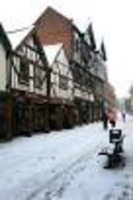Disappointing retail figures – including a slowdown in food sales – and the impact of the recent bad weather could plunge Britain into a triple-dip recession, experts are warning.

Snow way to run a business: Each day of snow costs the economy pound 473M, according to the insurance group RSA
Official retail figures released by the Office for National Statistics (ONS) revealed that December was a tough month for customers and retailers.
Excluding fuel, the ONS numbers showed the total value of sales (not seasonally adjusted) was up 1.8% in December compared with a year ago. In November the growth rate was 2.5%.
British Retail Consortium (BRC) director general Helen Dickinson said: “This confirms our own findings that it was a cautious Christmas for many of us. With many household budgets still feeling the squeeze and no signs of economic challenges receding any time soon, this led to a respectable rather than spectacular result during the most crucial trading period of the year.
Food slowdown
“Even food, which is usually dependable at this time of year, showed a slowdown in growth. This suggests that relentlessly tough times led many to ‘trade down’ to cheaper and own-label brands, but also that many economised so that they had more money to spend on treating family and friends with nice presents.”
The BRC has also announced that December shopping centre footfall was down by 2.8%, with out-of-town (OOT) 1% lower and the high street down by 0.5%.
There is now concern among analysts that figures due out on Friday (January 25) could show the economy shrunk by 0.1% in the fourth quarter of last year.
Furthermore, it is feared that the sub-zero temperatures and heavy snowfall in many areas of the UK could hit figures for the first quarter of 2013. That could lead to a second successive period of contraction – and confirming the country has succumbed to a triple dip recession.
Dhaval Joshi, managing editor with research group BCA, said: “In the current quarter, a week of snow may be enough to produce another negative figure: a triple-dip recession.”
Fragile economy
Howard Archer, economist at IHS Global Insight, said even limited disruption caused by snow could cause significant economic problems because of the fragile state of the economy.
Heavy snow in 2010 cost the economy -0.5% in gross domestic product in the fourth quarter of the year.
RSA, the insurance group, has estimated that each day of snow costs the economy pound 473M because a third of workers are disrupted by the poor travel conditions.
The BRC said that the snow was not helping and said retailers’ fortunes could be further hit by a rise in business rates in April.
“It’s a very challenging time for retailers anyway at the moment so anything like this, which deters shoppers further, doesn’t really help matters,” said the BRC. “Consumer confidence is still very low and people have very limited spending power. There’s no sign at the moment that things will let up in the economy.”
Snow business
Heavy snow in 2010 cost the economy -0.5% in gross domestic product in the fourth quarter of the year Each day of snow costs the economy pound 473M because a third of workers are disrupted by the poor travel conditions, said RSA December shopping centre footfall was down by 2.8%, with out-of-town 1% lower and the high street down by 0.5%, said BRC.





